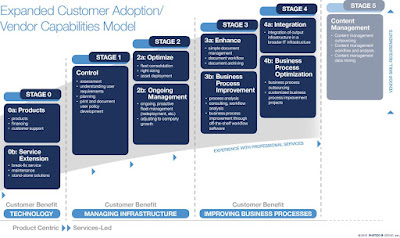3/2011
Managed Network Services(MNS) the "next frontier" in MPS - something new and until a few months ago, unobserved in our industry.
Managed Network Services is
"...the act of managing resources and processes associated with moving, saving and presenting information..." - look familiar?
Typically, this is in the Managed Services Provider's toolbox and supported by either Help Desk,
N.O.C, or both.
A few '
traditional' copier dealers have entered this arena - with success, even.
Of course, these Beautiful Ones, don't carry words like "copiers" or "laser" on their business card.
The effort here is a commendable, if not a bit transparent, marketing move. MPS is now crystallized, the market more mature, so let's define more mystery and sell MNS Training classes. I love it.
Don't get me wrong, MPS is an all-inclusive motion.
I've recognized this since the beginning, and remember the first time a colleague and I outlined the 4th, 5th, and 6th stages of MPS - back at iTEX 2009. (...technically, in a Japanese steak house, over beers... or was it whiskey...)
For most, MPS is simply Stage 1&2 - not much beyond; MPS players are stuck in the "MPS is CPC" world.
Now we're going to get into "Managed Network Services"?
There be Icebergs, ahead right...
When I speak with existing technology customers, folks who work with us on Exchange migration, Unified Communication, Staff Aug., N.O.C. services, or SharePoint projects and ask them to describe their existing MPS Engagement, the conversation goes something like this,
Client - "yeah, we have MPS"
Me - "really? Cool. What's that look like?"
Client - "they have a guy come in once a month and clean all the printers...they get my toner to my end users and service all the HP's...and they do this remotely with software..."
Me - "...great...how much has this saved you so far...?"
Client - "...bunches...oh, and they tell me they can do the same for all 1,500 laptops you guys sold me..."
Me - "...really? Impressive...can they image all your laptops, ITIL?"
Client - "...not sure..."
Me - "okay...so, how many copiers or printers have you eliminated?... What is your Print Policy? How much volume has been shifted off those expensive printers onto your leased copiers? Is your current MPS vendor set up to help you design your SharePoint project? Can they, do you, understand how all this impacts your documents and the costs associated with those documents?..."
Client - "...ummm..."
Me - "...or are they simply shipping toner, replacing maintenance kits, and blowing air up your paper tray, once a month ?"
Client - "...yeah..right..."
---------------------------------------
You get the point. And so do I.
The Separation Continues -
MPS, stages 1 & 2, are table stakes that must be offered if you are considering a future that does not include responding to SLED RFPs.
And not just for Managed Print Services or Managed Network Services, which is nothing more than another component of
Managed Services,(hint hint) you've got to be in S1/2 simply to survive in the short term.
For the long term, copiers are dead, MIF shrinking, volumes are down, and placements are still 27% below 2007 levels.
Managed Services are in everybody's future it's just that not everybody is going to be with us.
There is, of course, a very
BIG Butt - we know how to service copiers, and fulfill toner; but what the heck do you know about network traffic, CISCO switches, Blades, Data Centers, and ITIL?
Jumping from this dying puddle is the right idea, it's just that we're going into the deep end of a very large ocean already inhabited by some very capable and efficient sharks.
We're going to need a bigger boat.
Consider this a quote from a typical IT C-Level:
“We wanted to integrate voice, IP, and data on the same high-speed network for cost-saving efficiencies in terms of IT staff and for the easy rollout of new productivity-enhancing applications such as Service Advertising Protocol(SAP). [With our service provider] we are already seeing a return on investment and have found out how much more efficient our business can be.”
Bill Freyer
Vice President of Information Technology
JT International, Switzerland
Purchaser of Managed Service
One service provider for this and MPS too?
Two words of caution for any BTA/copier dudes, looking to expand into Managed Services:
1. When one of your copiers goes down for 2 days, some end users may get upset over the fact they need to walk down a floor to pick up output.
But, when you write and support an Managed Services SLA, a network or workstation down for 4 hours, will put your "MNS" practice in the ditch so fast you'll be running back to the demo floor, begging to discuss "scan once, print many" with the local church Deacon.
2. You are now competing in the VAR/MSP space, the originators of jargon and acronyms - when you throw the "...we now do NMS..." at the CIO, he is going to recognize you as a wanna-be, "MNS" hasn't been used since 2004.
Are you sure you want to be a Beautiful One?
pdf here.


















